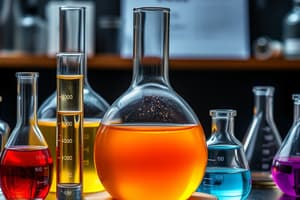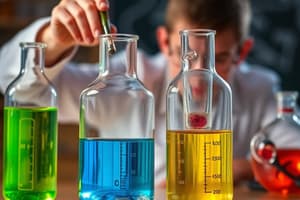Podcast
Questions and Answers
What is the first step in the scientific method?
What is the first step in the scientific method?
What does the research step in the scientific method involve?
What does the research step in the scientific method involve?
Which of the following best describes a prediction in the scientific method?
Which of the following best describes a prediction in the scientific method?
What is the purpose of the experiment step?
What is the purpose of the experiment step?
Signup and view all the answers
What should a scientist do after collecting enough data?
What should a scientist do after collecting enough data?
Signup and view all the answers
After completing a scientific experiment, what might a scientist consider if the results are unclear?
After completing a scientific experiment, what might a scientist consider if the results are unclear?
Signup and view all the answers
In a scientific experiment, what is referred to as 'evidence'?
In a scientific experiment, what is referred to as 'evidence'?
Signup and view all the answers
What is one possible action a scientist can take if they find their prediction was incorrect?
What is one possible action a scientist can take if they find their prediction was incorrect?
Signup and view all the answers
Which of the following is a key component of the scientific method that involves gathering information from previous works?
Which of the following is a key component of the scientific method that involves gathering information from previous works?
Signup and view all the answers
Study Notes
The Scientific Method
- The scientific method is a process scientists use to solve problems and answer questions.
- It involves a series of steps to ensure accuracy and reliability.
Steps of the Scientific Method
- Ask a Question: Identify the problem or question to be investigated.
- Research: Gather existing knowledge and information related to the question. Determine if similar questions have already been addressed.
- Prediction: Formulate a hypothesis or guess about the answer to the question.
- Experiment: Design and conduct a controlled experiment to test the prediction. Experiments can involve observations or measurements in a lab or field setting.
- Results: Analyze the data collected during the experiment and determine if the results support or contradict the prediction.
- Spread the Word (or Start Again): Communicate findings to others and consider whether further experiments are necessary, modifying the experiment if needed. Sharing results is crucial for the scientific community to learn and build upon previous work.
Example: Feeding Cats
- Question: Which food type do cats prefer?
- Research: Investigate available cat foods, considering commercial brands and home-prepared options.
- Prediction: Predict which food type the cat will prefer based on personal observations or prior knowledge about feline preferences.
- Experiment: Create a controlled feeding experiment, offering each food option at specific times and noting the amount consumed. Careful measurement and recording of observations is crucial.
- Results: Analyze the amount each food was eaten to determine the cat's favorite.
- Share Results: Communicate the findings with others (e.g., friends, online communities). The experiment could be repeated with different cats or different food types.
Studying That Suits You
Use AI to generate personalized quizzes and flashcards to suit your learning preferences.
Description
This quiz covers the essential steps of the scientific method, a fundamental process used by scientists to solve problems and answer questions. It focuses on understanding how to ask questions, conduct research, formulate hypotheses, and analyze experiment results. Test your knowledge of each step and its significance in scientific inquiry.



